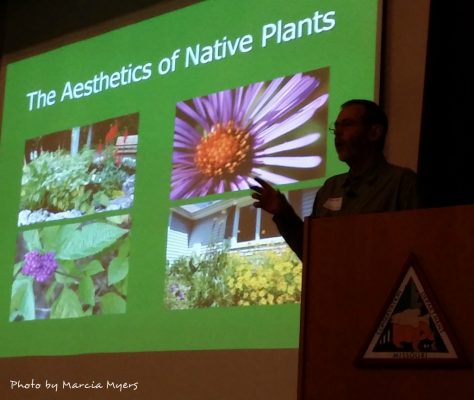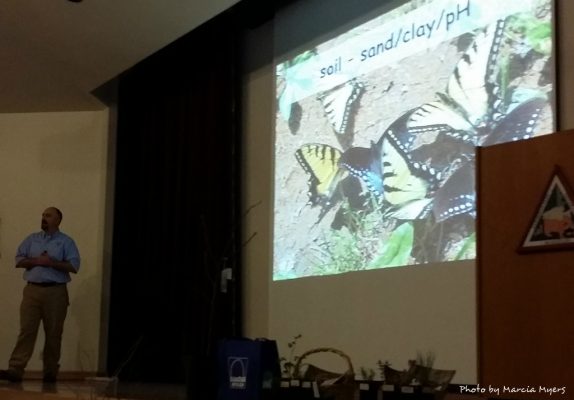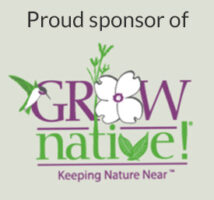By Marcia K. Myers
Blog Editor, Wild Ones – St. Louis Chapter
Since 2011, St. Louis Wild Ones has worked to provide this annual workshop in partnership with Metro St. Louis Sewer District, Missouri Department of Conservation (MDC), Shaw Nature Reserve, Bring Conservation Home, and Grow Native!
This program is on a three-year cycle. The workshop on March 26, 2016 was geared toward helping novice landscapers understand why using native plants in their yards is important, as well as give some tips on how to get started. Next year will be a gala, followed by a workshop in 2018 for intermediate-level landscapers.
Dave Tylka, a semi-retired Professor of Biology at St. Louis Community College (STLCC) at Meramec, was the keynote speaker this year. As a dynamic presenter, he certainly helped instill enthusiasm in the audience with his talk, Introduction to Gardening with Native Plants. He challenged us to think of plants not just as an aesthetic, which they certainly can be, but also to think about a plant’s function in the environment. Combining these characteristics adds depth to our landscaping endeavors, which, in turn, only adds to the enjoyment of our outdoor spaces.
Basically the why of planting natives was expressed in how we measure success. Are we:
- Performing less maintenance? The native plants are adapted to the climate and in some cases, poor soil, and thus, we can use fewer toxins or none at all.
- Seeing more species of pollinators (like insects and birds) and other wildlife? Not only can we increase biodiversity, but we can benefit from enjoying the creatures who are attracted to that environment.
- Receiving more sensory enjoyment? This more complex, total package that we create provides us with the rewards of eye candy, aromas, textures, and a variety of sounds. This depth stimulates our minds and gives us greater enjoyment.
Tylka cautioned against using native cultivars that have radically different flowers in color or shape and to avoid plants that are resistant to insects. We need insects. Watch the cultivars you do use to see if insects and birds are visiting these plants.
Tylka suggested we start small and see if we like it.
Resources:
- Book – Native Landscaping for Wildlife and People by Dave Tylka (out-of-print, but available used for reasonable prices on Amazon.com)
- Tylka teaches classes and offers workshops for the public throughout the year including at STLCC at Meremac and the Missouri Botanical Garden.
Perry Eckhardt was a boisterous speaker passionate about his topic, Landscaping for Wildlife. He works for MDC as a Community Conservation Planner. Eckhardt said if you want to attract wildlife to your yard, then give them what they need:
- Food
- Shelter
- Water
Wildlife requires habitat all year long so create a space which includes fruits, nuts, and seeds in the winter not just the rest of the year. Use plants that alternate throughout the seasons with some starting in the early spring, late spring, early summer, and so on.
As a former urban forester, he learned the importance of using plants appropriate for the site so study your yard first.
- Is the area sun, shade, or part-shade?
- What is the water drainage like? Is there standing water?
- How much space do you you need after the plants have grown to full size?
- What type of soil do you have?
Resources:
The information presented here is a summary of the morning speakers and only contains a relatively small portion of their entire presentation. Stay tuned for more great tips and information from the afternoon speakers in Part 2.




Dave Tylka is the BEST! It has been suggested that he take all of his information and the format of Bring Conservation Home to the TED TALK forum. His ideas are definitely worth sharing! He is a great teacher, mentor and activist. As a student of Dave’s, I learned a tremendous amount and was inspired to keep learning and to make a difference starting in my own backyard. Something we can all do….
Something else we can all do is: Nominate Dave Tylka and Bring Conservation Home for a TED TALK presentation! 🙂